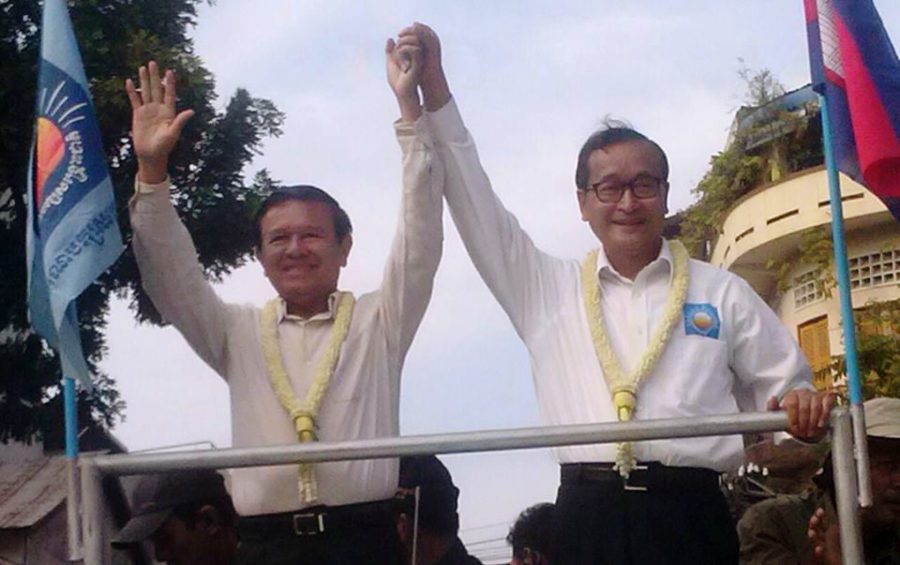A Phnom Penh Municipal Court judge and prosecutor probed Kem Sokha on Wednesday about his political collaboration with CNRP co-founder Sam Rainsy, in light of what the court officials called Rainsy’s “violent stance.”
Sokha, president of the outlawed main opposition CNRP, is on trial for allegedly conspiring with a foreign power to overthrow the government, a charge which he denies. He faces up to 30 years in prison if convicted.
On Wednesday afternoon, Sokha was again asked about the decision to merge his Human Rights Party with the Sam Rainsy Party (SRP) to form the CNRP, and whether any foreign national was involved in the decision.
In response to questions from Judge Seng Leang, Sokha repeated earlier statements that he was working at the will of the Cambodian people, and that while others had the right to raise questions or make requests, he would only follow the wishes of Cambodian citizens.
In the third month of Sokha’s trial, Leang spent much of the afternoon asking why Sokha would choose to work with Rainsy, who Leang referred to as “the convict” each time the judge referenced the CNRP co-founder.
“If the current law bans me from cooperating and I did, then I would be wrong,” Sokha said in court. “I chose to work with millions of people, not just that single person.”
Rainsy has lived abroad since 2015 to avoid a number of criminal convictions, which he calls politically motivated.
Describing one of Rainsy’s speeches, in which he suggested Cambodian armed forces turn their guns against the government, Leang argued that Rainsy’s rhetoric defied the party principles of his own SRP and the CNRP. The judge questioned why Sokha would cooperate with Rainsy.
“Two party leaders, one with a violent stance and another with a nonviolent stance. How can you work together?” Leang asked.
In response, Sokha noted that Cambodian political parties have held contrasting opinions and even fought each other, only to later unite. He referenced the alliance between Prime Minister Hun Sen’s ruling CPP and the royalist party Funcinpec, noting that they worked together and clashed in different periods.
“I have asked you how we [as Cambodian people] had killed each other in the past, but why can we now come and work together under the same constitution,” Sokha said.
Deputy prosecutor Vong Bunvisoth continued Leang’s line of questioning, asking Sokha whether he regretted his cooperation with Rainsy, and his colleague’s propensity for fiery rhetoric.
Sokha responded that he respected Cambodian law, reiterated that his politics were always nonviolent and questioned why the government had pardoned Rainsy in the past.
“You asked why I joined with [Rainsy], having seen him like this,” Sokha said. “I ask you instead, if the government knew Sam Rainsy was like this, why did they pardon Sam Rainsy in 2013?” Sokha said.
Bunvisoth did not respond to the question and repeated his query about whether Sokha regretted an alliance with Rainsy.
Sokha replied that if Bunvisoth was a politician, he would understand. In reality, no military upheaval as described by Rainsy had occurred, he added.
During the trial proceedings on Wednesday morning, judges accepted additional evidence that was introduced by prosecutors, despite the defense team’s claim that the move violated court procedures.
Judge Koy Sao said on Thursday that the trial will continue on March 25 and 26.












